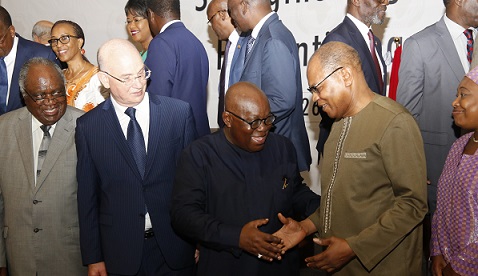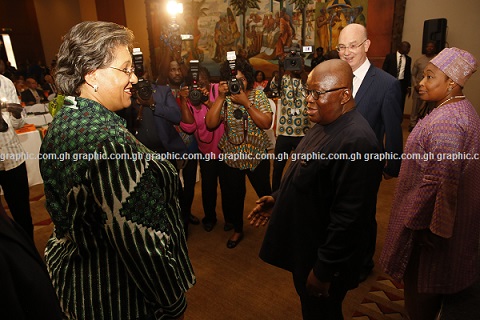
Fast-track integration process - Akufo-Addo tells African countries
President Nana Addo Dankwa Akufo-Addo has called on Africa countries to hasten their efforts towards continental integration, as it is the surest means of preventing instability, wars and the increasing threat of terrorism that undermine accelerated development.
Advertisement
President Akufo-Addo made the call when he addressed the African Union High-Level Retreat on the Promotion of Peace, Security and Stability in Africa in Accra yesterday.
The event was on the theme: “Strengthening the African Union’s Conflict Prevention and Peacemaking Efforts”.
President
President Akufo-Addo said the formation of the EU and the benefits its members had derived should inspire Africans towards the establishment of a fully integrated Africa.
He said the formation of the EU had helped to prevent war among members of the union, as against the past when countries such as Austria, Britain, France, Germany and Italy witnessed wars waged over religion, territories and power.
Challenge
“No country would want to integrate with another whose house is on fire,” he said, adding that currently terrorist groups had fed on the traditional threat to security and unleashed terror on the people to stifle their freedoms.
President Akufo-Addo lauded the collaboration among countries in different sub-regions in Africa, in particular concerning the fight against terrorists and armed groups, a situation which had given credence to the saying that in unity lay strength.

President Akufo-Addo interacting with Ms Hannah Tetteh (left), Director-General of the United Nations Office at Nairobi. Ms Minata Cessouma (right), African Union Commissioner for Political Affairs.
Impediments
He said in recent times the traditional challenges to security, such as chieftaincy, armed robbery, religious intolerance, ethnic conflict and political rivalry, were being compounded by threats of drug and human trafficking, the proliferation of small arms and light weapons, cyber crimes and activities of nomadic herdsmen.
He added that the emergence of transnational organised crimes and the evolving nature of terrorists, especially in the Sahel Region, continued to derail efforts at making Africa stable.
Threats
President Akufo-Addo called for greater efforts at tapping into what he called “the bubbling volcano of the army of young unemployed” for development.
According to the World Bank, more than 50 per cent of the population in 40 African countries was under 20 years.
President Akufo-Addo explained that failure to create opportunities and jobs for the youth would culminate in turning them into instruments of instability or targets of recruitment by terrorist groups.
He said it was crucial that African countries provide the youth with access to education, transform the structure of their economies from
Ibn Chambas
In his remarks, the Special Representative of the UN Secretary-General and Head of the UN Office for West Africa and the Sahel (
He expressed regret that very often the international community’s response had been too little too late, adding that the first shared obligation was to confront the root causes of the conflict by strengthening prevention through mediation.
AU
In his opening address, the AU Commissioner for Peace and Stability, Ambassador Smail Chergui, said the retreat was taking place at a time when such efforts were being put to test by the erosion of multilateralism, the ever-changing global political landscape and emerging threats to peace and security such as climate change and rapid urbanisation.
He stated that scientists had stated that sea levels were projected to rise 10 per cent higher than the global mean along African coasts, with the most vulnerable areas in terms of population and assets at increased risk of flooding being Egypt, Cote d’Ivoire, Guinea-Bissau, Mozambique, Nigeria, Tanzania, The Gambia and Tunisia.



